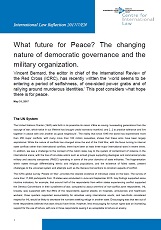What future for Peace? The changing nature of democratic governance and the military organization.
What future for Peace? The changing nature of democratic governance and the military organization.
Author(s): Pauline Collins
Subject(s): International Law, Governance, International relations/trade, Military policy, Peace and Conflict Studies
Published by: Ústav mezinárodních vztahů
Keywords: effective Democracy; good governance; nation state;
Summary/Abstract: The United Nations Charter (1945) sets forth in its preamble its raison d’être as saving “succeeding generations from the scourge of war, which twice in our lifetime has brought untold sorrow to mankind, and […] to practice tolerance and live together in peace with one another as good neighbors”. The reality that since 1945 the world has experienced more than 250 major conflicts, with many more than 100 million casualties, shows that these aims have been largely aspirational. While the nature of conflicts has changed since the end of the Cold War, with the focus turning to internal state conflicts rather than international conflicts, there have been at least three major international wars in recent times. In addition, we see a challenge to the concept of the nation state, key to the system of containment of violence in the international arena, with the rise of non-state actors such as armed groups supporting ideologies and commercial private military and security companies (PMSC) operating in some of the prior domains of state militaries. The fragmentation within states through/ differentiating ethnic and religious populations, and the existence of failed states, present challenges to the universal system and attempts such as the Geneva Conventions to constrain aspects of conflict.
Series: IIR - INTERNATIONAL LAW REFLECTIONS
- Page Count: 6
- Publication Year: 2017
- Language: English
- Content File-PDF

